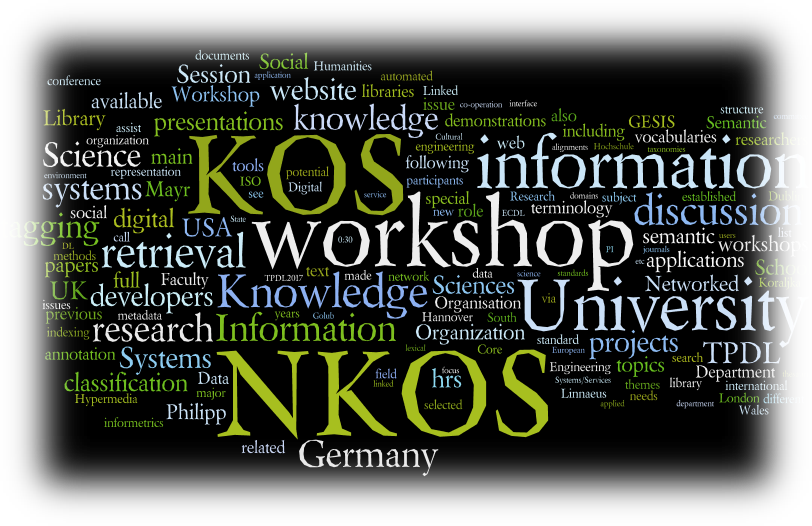Call for presentations and demos
The 17th European Networked Knowledge Organization Systems (NKOS) workshop will take place on Thursday 21st September 2017 as part of TPDL2017 Conference in Thessaloniki, Greece.
Important Dates:
- Submission deadline (Extended): Monday 10th July 2017
- Notification of acceptance (Extended): Thursday 20th July 2017
- Camera-ready contributions: Friday 8th September 2017
- Workshop: Thursday 21st September 2017

All submissions must be written in English following Springer LNCS author guidelines. Regular papers should have a maximum of 12 pages. Short papers (incl. extended abstracts) should have a maximum of 6 pages. Both should be submitted as PDF files to EasyChair. All submissions will be reviewed by at least two independent reviewers. Please be aware of the fact that at least one author per paper needs to register for the workshop and attend the workshop to present the work. In case of no-show the paper (even if accepted) will be deleted from the proceedings AND from the program.
Springer LNCS: http://www.springer.com/gb/computer-science/lncs/conference-proceedings-guidelines
EasyChair: https://easychair.org/conferences/?conf=nkos2017
Workshop proceedings will be deposited online in the CEUR workshop proceedings publication service (ISSN 1613-0073) - This way the proceedings will be permanently available and citable (digital persistent identifiers and long term preservation).
After the workshop, copies of presentations will be made available on the workshop website. Presentations from the workshop may be encouraged to be submitted as extended papers for peer reviewed journal publication.
We invite submissions for:
a) Presentations (typically 20 minutes plus discussion time, potentially longer if warranted) on work related to the themes of the workshop (see below). An option for a short 5 minute project report presentation is also possible.
b) Demos on work related to the themes of the workshop (see below).
We especially invite descriptions of running projects and ongoing work. Papers that investigate multiple themes directly are especially welcome.
Themes for the NKOS workshop will be:
- KOS Alignment. KOS alignment or terminology mapping plays a vital role in NKOS for many years. This year we want to sort out the needs (use cases) of KOS alignments in the new environment of Linked Open Data. We plan to collect methodologies, best practices, guidelines and tools. This includes manual and automatic alignments.
- KOS Linked Open Data. Recent years have seen an increasing trend to publication of KOS as Linked Data vocabularies. We need discussion of practical initiatives to link between congruent vocabularies and provide effective web services and APIs so that applications can build upon them.
- KOS and Document Retrieval. Documents or parts of documents are nowadays not only accessible via their metadata but their abstracts and in many cases the full texts are electronically available. Thus, these documents also can be found by search engines. Given this possibility of full text search the role of classification and annotation has to be redefined. Questions like the following ones arise: can traditional knowledge organization and document annotation improve full text retrieval? Are classification, categorisation, annotation, tagging, and full text retrieval complementary, or how can they be made complementary? What should be the focus of annotation, if full text retrieval is available?
Further timely presentations/demonstrations will be selected from the following topics in the call for papers: - KOS-based recommender systems. The suggestion of the right meaningful concepts is a mission critical phase for searchers in modern DL.
- Observatory for Knowledge Organization Systems – following the recent Knowescape workshop with its main topics KOS provenance and versioning.
- Meaningful Concept Display and Meaningful Visualization of KOS.
- Standards developments.
- Evaluation of KOS-based systems – methods and practical experience.
KOS applications are a regular and important part of NKOS workshops. Example topics include: - KOS in e-Research metadata contexts - intersection between research data, KOS, Semantic web.
- Social tagging. What is the role of social tagging and informal knowledge structures versus established KOS? (How) can tagging be guided and informed by KOS?
- Users interaction with KOS in the online environment.
- KOS and learning. What is required to use KOS effectively to convey meaning, to assist users to express their information needs to assist in sense making and learning?
- Multilingual and Interdisciplinary KOS applications and tools.
- Specific domains, such as environmental, medical, new application contexts, etc.
More information on the workshop can be found in the workshop proposal